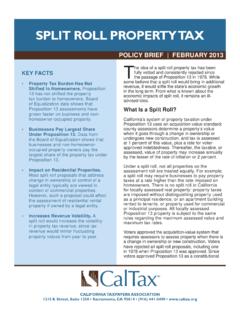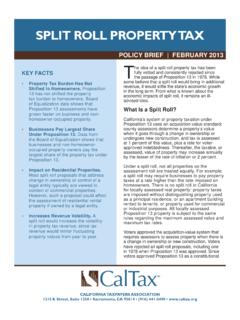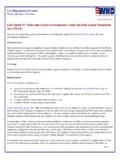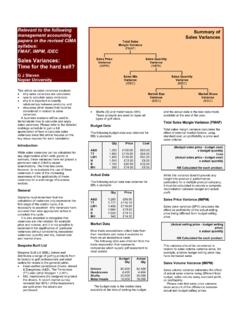Transcription of SALES TAX ON SERVICES - California Taxpayers Association
1 SALES TAX ON SERVICESPOLICY BRIEFJ anuary 2013 What Is a SALES Tax on SERVICES ?Currently, Californians pay taxes on the purchase or use of various tangible goods, such as clothing, cleaning supplies, school supplies, etc., but do not pay taxes on SERVICES , such as those provided by a dentist, lawyer, or plumber. A SALES tax on SERVICES is the imposition of a SALES tax on the purchase of a current statewide base SALES and use tax rate is percent, but local governments can tack on local transactions taxes up to 2 percent. Some local jurisdictions are authorized to exceed the 2 percent This the Solution to the State's Fiscal Problems?As California 's fi scal woes have worsened, there have been renewed discussions over imposing SALES tax on SERVICES , often proposed in the name of "modernizing the economy," closing California 's budget gap, and stabilizing cyclical fl uctuations in tax revenue. There are several reasons why a SALES tax on SERVICES would not help the state achieve these , taxed activities tend to grow slower than untaxed activities.
2 If California 's economic future depends on the production of high value-added SERVICES , taxing those SERVICES merely serves to slow economic growth. A tax on labor, at a time when California 's unemployment rate remains high and California 's recovery lags the nation's, would be a signifi cant setback to regaining the jobs lost during the last several broadening the SALES tax to SERVICES would bring in some amount of new revenue to the state, it could stifl e long-term economic development. Taxing SERVICES may lead to migration of service jobs and service end-user companies out of state. It could lead to Taxpayers performing SERVICES themselves rather than hiring professionals. And it could lead to businesses going underground to avoid the tax. All of these situations would produce lower personal income tax and corporate tax revenue, as well as lower SALES tax revenue for the state over the long , fl uctuations in state general fund revenue are directly attributable to the state's overreliance on income taxes paid by top income earners.
3 Under the current tax system, the top 1 percent of California Taxpayers pay about 40 percent of all state personal income taxes, and provide the bulk of the money for state general fund programs. Although broadening the SALES tax base would bring in additional revenue, it may not bring stability to the state's overall revenue. Past proposals tended to tax nonessential SERVICES (pool cleaning, lawn care, house cleaning, etc.), which tend to rise and fall with the economy, while exempting critical SERVICES that tend to be more resistant to economic fl uctuations (medical care, education, and automotive repair). Since the new revenue stream would be closely tied to the economy, a SALES tax on SERVICES may not insulate the general fund from cyclical highs and lows, and in some years, could make overall revenue even less , a SALES tax on SERVICES could set up the state for a budget defi cit if actual revenue falls short of projections. Historically, the state tends to spend much, if not all, of projected revenue receipts.
4 If actual tax revenue collections are lower than projections which they sometimes are because state agencies use static revenue estimates that do not take into account changes in taxpayer behavior the state may run a defi cit by spending all the money it anticipates receiving in the fi scal year without making mid-year spending adjustments when revenue falls BRIEFO verall fi scal stability cannot be achieved solely by raising revenue, it must be accompanied by an effective rainy day reserve requirement. The Commission on the 21st Century Economy noted that in order to make the overall fi scal situation more reliable and less volatile, "On the budget side, reserve funds that are properly designed, established, and maintained can help address one of the major byproducts of tax revenue instability the tendency to overspend in good times and to run short of funds during economic downturns."1 Fourth, while the economy in general has moved from manufacturing to a service industry from an employment perspective, from a taxable consumption perspective, there is simply no conclusive evidence that consumption of SERVICES has outpaced the consumption of goods, as some have claimed as the reason for wanting to "modernize" the tax system.
5 To the degree that taxable SALES have declined as a percentage of personal income, it could be explained by several reasons: (1) greater consumption of goods that currently are exempt from taxes, such as food, prescription medicines, etc. (2) higher consumption of various SERVICES that the Legislature likely will exempt from a SALES tax, such as medical care, education and automotive repair; and (3) the decline in prices of goods due to lower production costs Is the Economic Impact on California ?A broad-based tax on SERVICES would have adverse impacts on California 's working families, would put California 's businesses at a competitive disadvantage negatively impacting jobs and would harm the state's overall job climate as discussed below: Puts California businesses at a competitive disadvantage. California has the highest SALES tax rate in the nation, and the highest top personal income tax rate compared to other states. A SALES tax on SERVICES would make it even harder for California companies to compete, on several levels.
6 First, California service industries would have a signifi cant competitive disadvantage compared to SERVICES provided in other states, because companies that could obtain less costly SERVICES 1 Commission on the 21st Century Economy Report, 2009out of state would do so. Not only would this have a direct adverse impact on service industries, it also would make it more costly for California companies that use taxable SERVICES to produce or provide goods. Thus, California products would be less price-competitive than their out-of-state (and federal) counterparts. FedEx and UPS, for example, would be severely disadvantaged if their shipping costs were 7 percent to 10 higher than those of the United States Postal Service, which would be excluded from the tax due to the Federal Commerce Clause. A tax on SERVICES would threaten many of California 's critical industries, including high-tech, the fi nancial sector, and advertising. Moves jobs out of state.
7 Economists recommend against taxing business-to-business SALES , as it leads to "tax pyramiding," which refers to a multiple-taxation phenomenon of taxing an input as it moves through the various stages of production, and taxing it again when purchased by a consumer. According to a nationwide study conducted by Ernst and Young LLP on behalf of the Council on State Taxation, " SALES tax on business inputs was almost three times larger than state corporate income taxes."2 With California having the highest SALES tax rate in the nation, a SALES tax on SERVICES would make it even more expensive for businesses to operate here, leading to lost jobs and investment opportunities as companies look to relocate or expand in other states. In-state employers also may have to reduce their workforce to accommodate cost increases. Puts small businesses at risk, potentially drives them underground. Higher taxes on certain SERVICES could lead to a do-it-yourself approach for many Taxpayers .
8 For example, if a tax were imposed on pool cleaning SERVICES , some Taxpayers may opt to do the work themselves rather than pay the increased cost. This could put many small businesses and their employees out of work. Additionally it could drive others to move their operations into the underground economy, putting law-abiding service businesses at an unfair disadvantage. Both of these situations would reduce tax revenues to the general Council on State Taxation, SALES Taxation of Business Inputs Existing Tax Distortions and the Consequences of Extending the SALES Tax to Business SERVICES , 20053 SALES TAX ON SERVICES Discriminates against small businesses. Larger businesses that can afford to hire employees to do the work of an independent contractor would not pay SALES taxes on any SERVICES performed by these employees. Smaller businesses, however, would be forced to pay SALES tax, as they must contract for these SERVICES . This results in higher costs on small businesses.
9 Hurts working families and disadvantaged communities. Expanding the SALES and use tax to SERVICES creates a more regressive tax base, because the tax requires working families and disadvantaged communities to pay a larger portion of their income than higher-income Taxpayers for service-related taxes. The California Budget Project notes that "extending the SALES tax to SERVICES is unlikely to improve the equity of the SALES tax."3 Repair SERVICES are particularly integral to budgets of families who cannot afford to purchase a new appliance, or a new home. Costly taxes would have to be paid on SERVICES to repair leaky pipes, replace a roof, or perform any other needed maintenance and repair. This runs counter to the basic policy principle that taxes should be based on an individual's ability to pay. Increases costs to government. Unlike many states, California taxes SALES made to and by state and local government. Government entities, including school districts, are huge consumers of SERVICES , and would incur cost increases of 7 percent to 10 percent on taxed SERVICES they purchase.
10 Moreover, government is a huge seller of SERVICES of everything from education (colleges and universities) to housing SERVICES (low-income housing authorities) to medical care (public hospitals). Thus, taxing SERVICES shifts a signifi cant portion of the SALES tax burden to government, thereby increasing the cost of government for Taxpayers and those who consume SERVICES sold by the government ( , increasing tuition on college students). Creates costly and extensive administrative problems. Imposing a SALES tax on SERVICES would lead to extensive administrative problems. For example, the Board of Equalization (BOE) would have to identify and register myriad new businesses, many of which are unfamiliar with SALES and use tax reporting and remittance 3 California Budget Project, Should California Extend the SALES Tax to SERVICES ?, 2011requirements. The BOE potentially would have to register teenagers who provide babysitting SERVICES , mow lawns, or tutor agency also would need to develop a new method for auditing service providers, which will prove diffi cult because BOE staff would have to determine where a particular service was used or consumed, if doing so is even possible.










